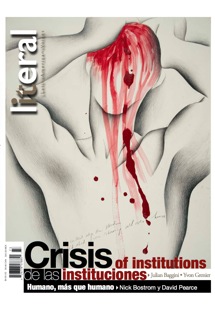LITERAL 31
Crisis of Crisis / Crisis de la crisis
Economic crisis, government cutbacks for the sake of laissez faire, the expansive boom in smartphones and tablets, the inexhaustible demand for individual attention as well as the war on drug trafficking–one that involves not only Mexico, but so many other countries as well–are all spinning out of control; the basic fundamentals on which modern nations were built and the social commitments that have been in place since Rousseau wrote his Social Contract have eroded. Institutions are in crisis, and there is still much consensus work to be done before we can hope to repair them. As Yvon Grenier states in his article, published here: “Crisis means a turning point, one that is typically unexpected in its manifestation or its intensity, and for which the affected population and its leaders are ill prepared.” The reflections we present in this issue are intended to make a modest contribution to the current dialogue regarding both institutions and the pillars that sustain them. Thus, we make room for the ideas of Nick Bostrom, David Pearce, Jodi Dean, Yvon Grenier, Ramón González Ferriz, and Julian Baggini. In addition, Brazil makes its presence known in this winter issue through the contributions of Tatiana Levy, Julián Juks, and the poet Sebastiao Uchoa Leite. And to close with a clasp of gold, as we say in Spanish, we proudly present an exclusive interview with Pulitzer Prize-winning author Junot Díaz, as well as a review of his latest book.
El colapso de la economía, el adelgazamiento gubernamental en aras del laissez faire, la desmesurada explosión de los teléfonos inteligentes, las tabletas, la inagotable demanda por la atención del individuo así como la desbordada guerra contra el narcotráfico –que involucra no sólo a México sino a muchos países–, los principios fundamentales sobre los que se construyeron las naciones modernas y los compromisos sociales desde que Rousseau escribiera su Contrato Social, están siendo erosionados. Las instituciones se encuentran en crisis y repararlas exige un arduo trabajo de consenso. Como dice Yvon Grenier en el artículo que aquí publicamos: “Crisis significa punto de inflexión, habitualmente inesperado en su manifestación e intensidad y para el que la población afectada, lo mismo que sus líderes, están mal preparados”. Las reflexiones que presentamos en esta entrega, tienen la intención de contribuir de forma modestísima al diálogo sobre las instituciones y los pilares que las sostienen. De ese modo damos cabida a las ideas de Nick Bostrom, David Pearce, Jodi Dean, Yvon Grenier, Ramón González Ferriz y Julian Baggini. Asimis- mo, Brasil se hace presente en esta edición de invierno a través de las colaboraciones de Tatiana Levy, Julián Fuks y el poeta Sebastião Uchoa Leite. Para cerrar con broche de oro ofrecemos una entrevista exclusiva con el premio Pulitzer Junot Díaz, junto con una reseña de su libro más reciente.


